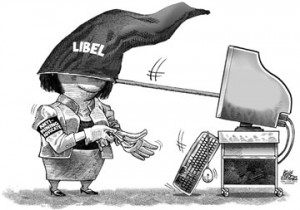Wait, is that cybercrime libel?

When news came out that Esperlita “Perling” Garcia, a teacher and anti-mining advocate was arrested for a libel case for a posting in Facebook, the knee-jerk reaction was to blame the Cybercrime Prevention Act or Republic Act 10175.
Many cried foul because the law’s implementation has been suspended by a 120-day temporary restraining order by the Supreme Court. That’s true, the TRO is in effect.
A closer look at the case, however, showed that the libel case predates the cybercrime law. The complaining Gonzaga, Cagayan Mayor Carlito Pentecostas Jr . filed the case in 2010.
At least three things can be gleaned from this episode.
One, RA 10175 does not prescribe the crime of libel. The Revised Penal Code (RPC) does.
Article continues after this advertisementThe major objection to punishing libel with the cybercrime law is that the new law raises the penalty a degree higher for online publications compared to ordinary libel committed through print or broadcast.
Article continues after this advertisementThe Revised Penal Code requires that libel must have the elements of a) defamatory imputation tending to cause dishonor, discredit or contempt; b) malice, either in law or in fact; c) publication; and d) identifiability of the person defamed.
There are legal arguments that online publication do not satisfy the element of publication. Based on statutory law which would bring us back to 1932 when the RPC was enacted, the framers of the law could not have intended punishing libel in online publications as the media platform did not even exist at that time.
No test case has set up the jurisprudence for this, but there is a a trend of recognizing online publications and social networks like Facebook as qualifying for the element of publication in libel.
In Cebu, at least two libel cases in court are a a result of alleged defamatory postings in Facebook.
Second point : Whatever platform of communication is used, it should be used responsibly.
Being fair, using the right facts, verifying claims, avoiding deliberate harm to others and taking responsibility for one’s utteracess are essential.
Third, public figures should not be onion-skinned about criticism made in good faith for public interest.
Libel in whatever form becomes dangerous to democracy when it is used as a weapon to stifle dissent. This is why the continuing campaign to decriminalize libel — not strike it out of the law books, but to remove the punishment of jail terms — should continue. The freedom to call out erring public officials or expose corruption is a necessary tool to make government truly transparent and accountable.